Weekly Recap
Last week was a key week for U.S. inflation and jobs data. Attention was on the US consumer price inflation, as investors looked for any potential impact on the Fed’s September meeting. The report showed that CPI inflation increased to 2.9% annualised in August, in line with expectations, up from 2.7% the prior month. Meanwhile, US PPI (factory gate) inflation fell to 2.6% annualised, well below expectations of 3.3% and on a monthly basis, actually fell -0.1%.
However, the bigger market driver was the US labour market data, which showed that the labour market is starting to crack. The Bureau of Labour Statistics downwardly revised its revisions for jobs for the 12 months through to March by 911,000, signaling that the labour market was weaker than initially thought. Initial jobless claims for the US also jumped by more than expected by 263,000 in the past week, marking the highest level in almost four years and well above the pullback to 231,000 forecast.
The weaker jobs data fueled expectations that the Federal Reserve will cut rates in September, despite US inflation ticking higher. As a result, U.S. stocks rose across the week, climbing to fresh record highs. The Dow Jones closed above 46,000.
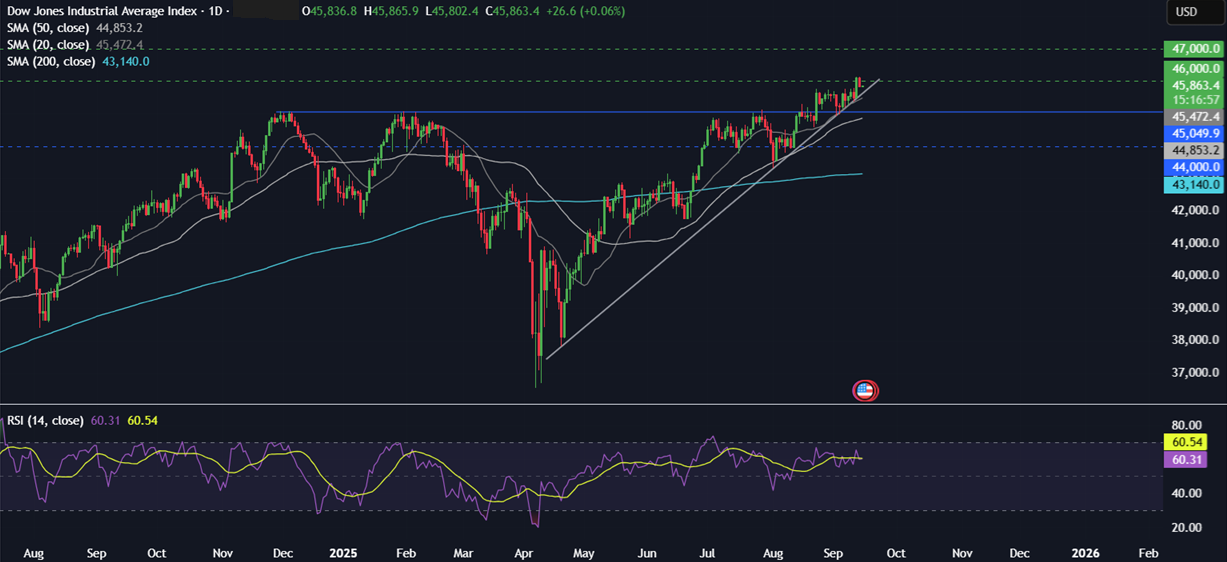
Gold rose to record levels, supported by a weaker USD and optimism surrounding Fed rate cuts.
US retail sales (Tuesday)
Expectations are for US retail sales to rise 0.3% month on month in August, down slightly from 0.5% MoM in July. Bank of America’s monthly consumer checkpoint data showed credit and debit card spending per household rose 1.7% annually in August, down modestly from 1.8% in July. Weaker spending growth, especially among younger generations, due to slower labour market gains and smaller pay increases from job changes, is weighing on sales. Meanwhile, easing housing costs amid lower new rent payments could help support spending. Currently, US data is weak enough to support rate cut expectations but not create concerns over a recession. Any signs of very weak data could unnerve the market and pull stocks such as the S&P 500 and the Nasdaq lower. However, sales in line with forecasts could help the stock indices rise.
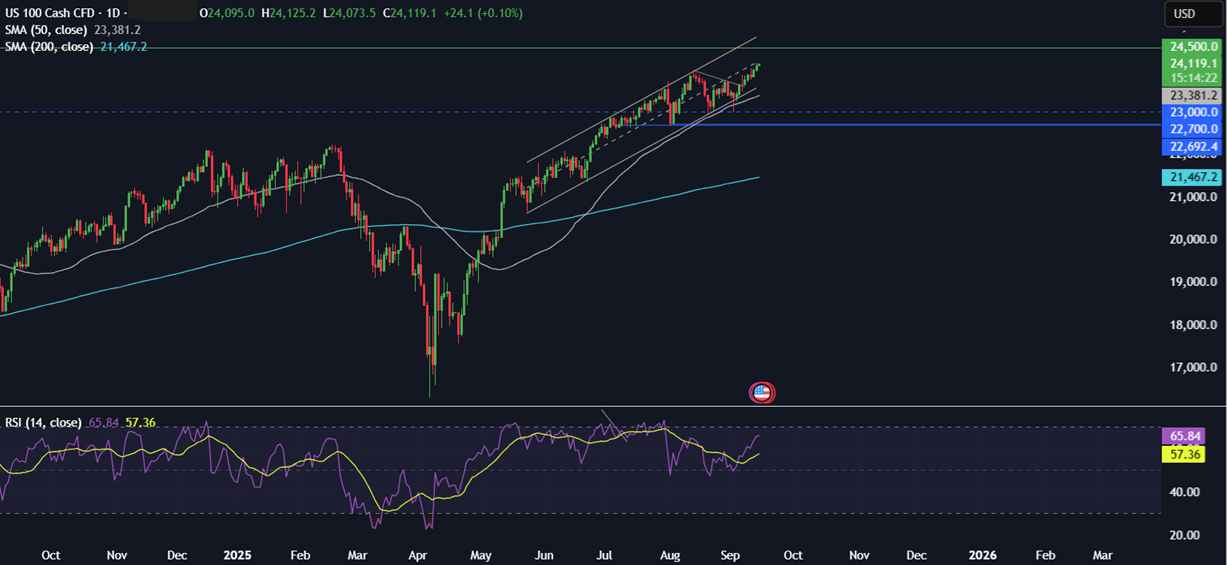
UK CPI (Wednesday)
While UK inflation, jobs, and retail sales data are due this week, they will play second fiddle to the Bank of England rate decision on Thursday. Wednesday’s inflation data is the final reading ahead of the BoE meeting, but isn’t expected to change the decision. CPI is expected to rise to 3.9% annually from 3.8% in July, whilst core inflation, which excludes more volatile items such as food and fuel, is expected to ease to 3.7% down from 3.8%. Service sector inflation, which is watched closely by the Bank of England, is expected to remain unchanged at 5%. The BoE expects inflation to peak at 4% which is likely to keep the central bank from cutting interest rates until next year—cooler than forecast CPI could lift sentiment towards the FTSE 100 index, which trades near record highs.
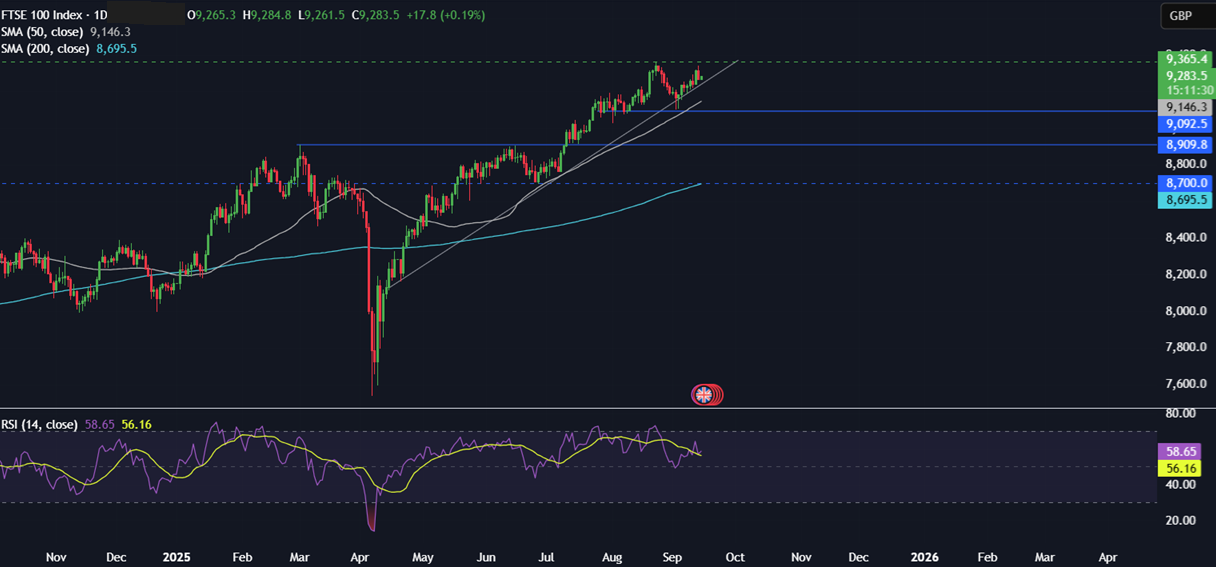
FOMC rate decision (Wednesday)
The Federal Reserve will announce its rate decision on September 17 and is fully expected to lower rates. The meeting comes amid clear signs that the US labour market is weakening and despite CPI rising to its highest level in 7 months as Trump’s tariffs add inflationary pressures. While inflation is a concern, the Fed has made it clear that the labour market is more important right now. According to the CME Fed watch tool, the markets are pricing in a 97% probability of a 25 basis point rate cut to 4.25%-4.5% and a 3% chance of a larger 50 basis point rate reduction to 4%-4.25%. As the rate cut is fully priced in, attention will be on how many more rate cuts we can expect from the Fed this year. The market is pricing up to three 25-basis-point rate cuts before the end of the year, more than what the Fed is guiding for at the moment. Investors will look to the updated summary of projections and dot plot for signs of deeper cuts ahead, which could pull USD lower and lift Gold to fresh record highs.
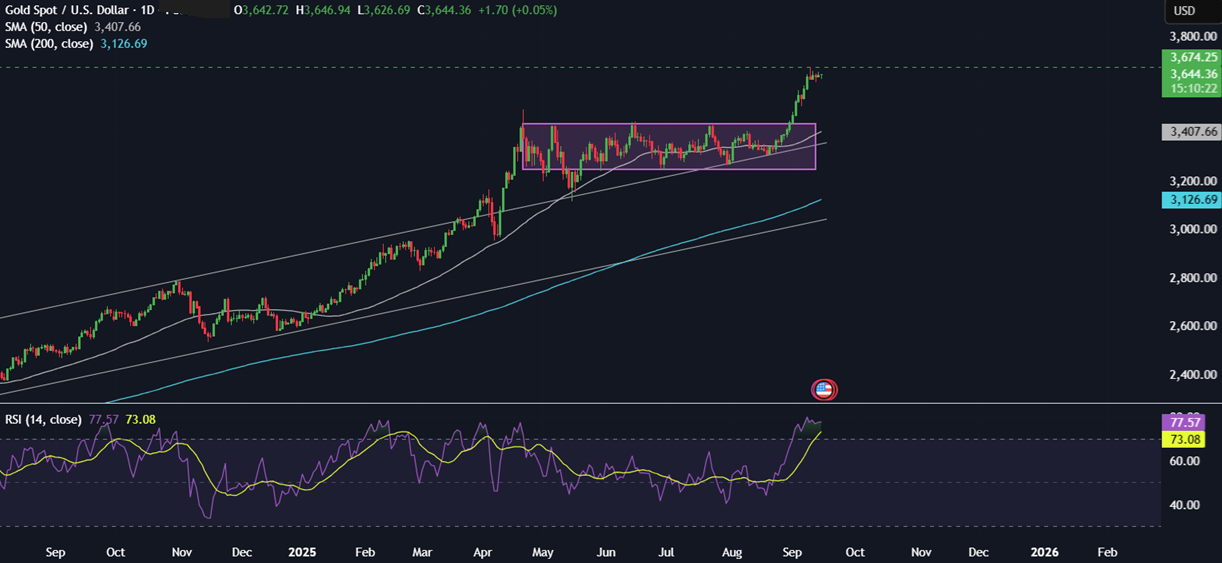
BoC rate decision (Wednesday)
The BoC is widely expected to cut interest rates by 25 basis points at its meeting on September 17. However, it is by no means a done deal despite the dramatic slowdown in the jobs market. Data on Friday showed that Canada lost 66,000 jobs, defying expectations of modest gains in job creation, and the unemployment rate rose to 7.1%. This latest labour market report highlighted the fragility of the current jobs market and prompted a readjustment of expectations surrounding this week’s BoC monetary policy. However, it is worth noting that inflationary pressures remain significant and could prompt the central bank to adopt a more cautious approach. The meeting also comes amid expectations that the economy will slow this year owing to Trump’s tariffs on Canadian imports. Forecasts are for GDP growth of 1% to 1.2% down from 1.6% last year. A dovish sounding BoC could boost USD/CAD, although that would also depend on the Fed.
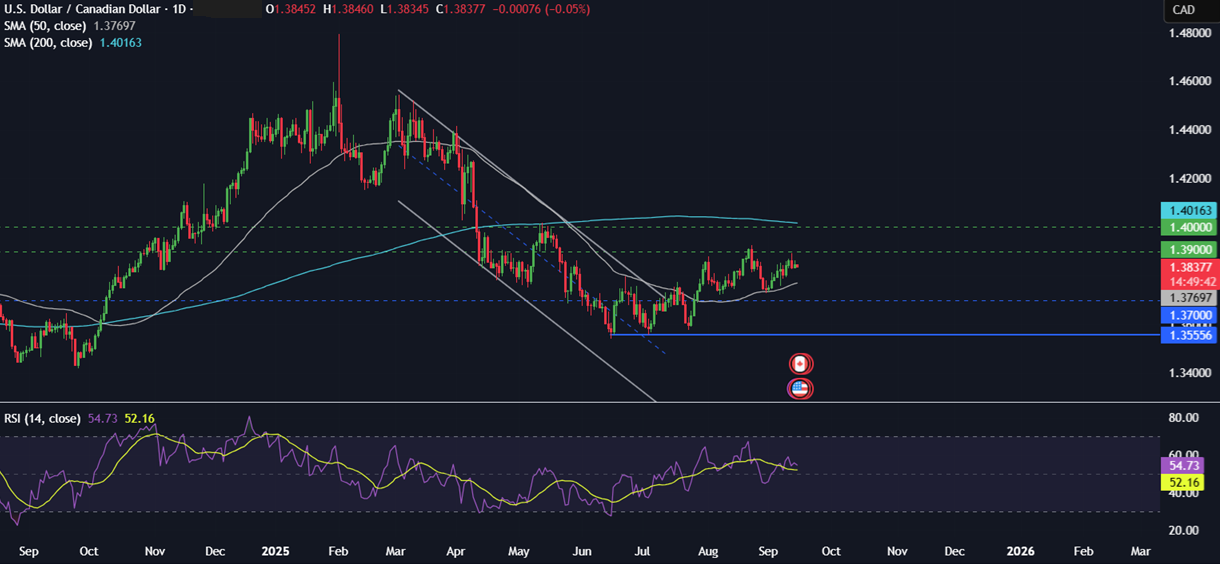
BoE rate decision (Thursday)
The Bank of England is expected to leave interest rates on hold at 4% in the meeting on Thursday. While growth in the UK has stalled at 0% MoM in July, inflation remains sticky at 3.8% YoY and is expected to continue rising to 4%. Meanwhile, fiscal difficulties continue to provide a headwind for GDP; the rising cost of servicing debt, together with contractionary fiscal policy, was a drag. The Bank of England is unlikely to make a move on rights before the Chancellor’s budget in late November, where she is expected to outline tax increases to fill a huge black hole. As a result, the central bank may not be looking to cut rates until next year. On the one hand, this could offer support to the pound against the US dollar. However, if the market becomes too concerned over the deteriorating outlook, GBP could struggle into the end of the year.
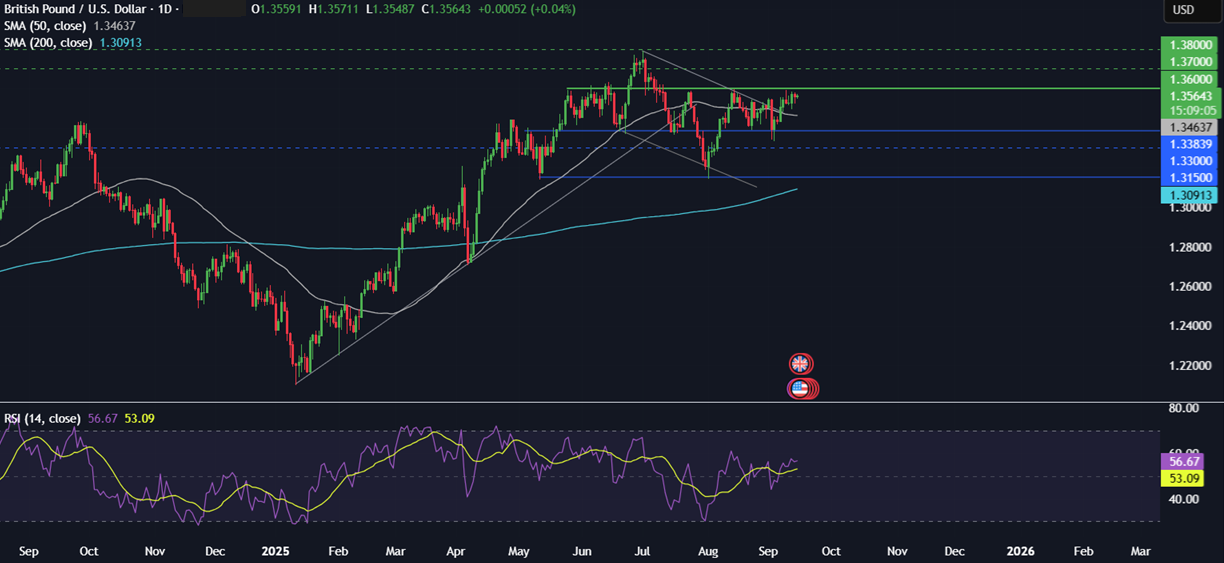
BoJ rate decision (Friday)
The Bank of Japan is expected to leave interest rates unchanged at 0.5% at the meeting on Friday amid political uncertainty and as policymakers wait for more time to assess the impact of the US-Japanese trade deal. The US trade deal is expected to result in another month of falling exports in Japan in August, and imports could also decline due to lower global commodity prices. CPI is expected to ease to 2.9% year over year in August, but core inflation should stay above 3% supporting a potential BoJ rate hike in the coming months. In the previous meeting, the BoJ reiterated that it would continue to raise rates if the economy and rates move in line with forecasts. That said, BoJ governor Ueda may refrain from overly bullish comments given Japan’s political climate after Prime Minister Ishiba resigned last weekend. Any sense that the central bank is prepared to hike again soon could pull USD/JPY lower to break out of range.
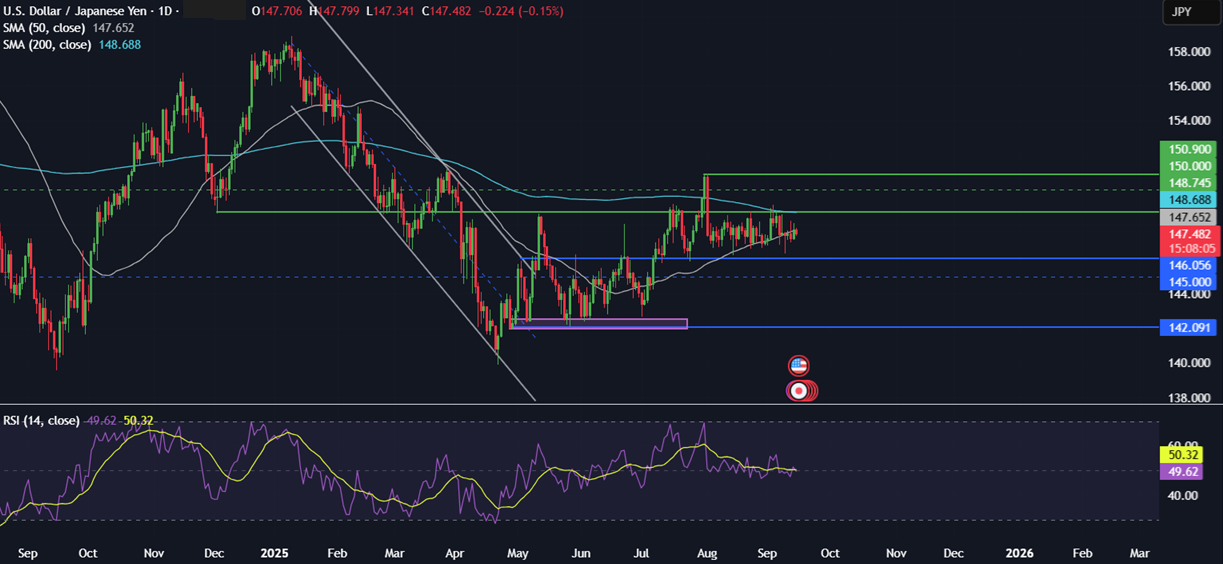
Trading involves risk.
The content provided here is for informational purposes only. It is not intended as personal investment advice and does not constitute a solicitation or invitation to engage in any financial transactions, investments, or related activities. Past performance is not a reliable indicator of future results.
The financial products offered by the Company are complex and come with a high risk of losing money rapidly due to leverage. These products may not be suitable for all investors. Before engaging, you should consider whether you understand how these leveraged products work and whether you can afford the high risk of losing your money.
The Company does not accept clients from the Restricted Jurisdictions as indicated in our website/ T&C. Some services or products may not be available in your jurisdiction.
The applicable legal entity and its respective products and services depend on the client’s country of residence and the entity with which the client has established a contractual relationship during registration.




